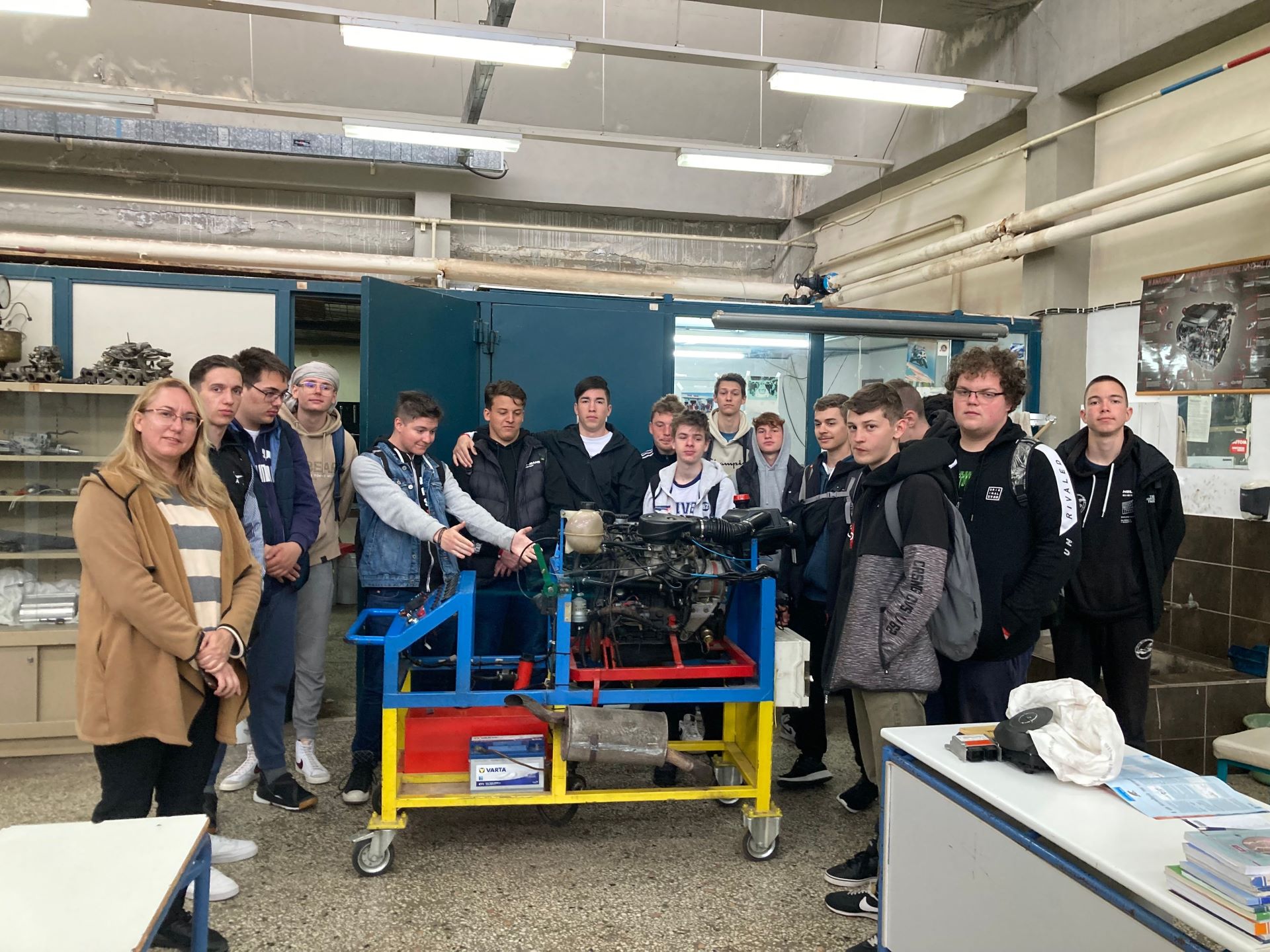
Experiences, insights and successes at the Jendrassik György Vocational Training Centre and Mechanical Engineering Technical School, Szolnok
Future Professionals Discovering Europe
Awarded Institution: Szolnoki SZC Jendrassik György Gépipari Technikum (Jendrassik György Vocational Training Center and Mechanical Engineering Technical School, Szolnok)
Project title: European Experiences of Mechanical Engineers
For today’s vocational education students, it is essential to possess up-to-date professional knowledge, foreign language skills, and international experience. Recognizing this, the Jendrassik György Vocational Training Centre and Mechanical Engineering Technical School, Szolnok launched its award-winning Erasmus+ project. The primary objective was to encourage students to become more open to studying and working abroad, and to communicate effectively in English in both professional and everyday contexts.
We spoke with the school principal, Aranka Molnár, about the award-winning project.
What inspired the project, and what goals were set in advance?
The primary aim was to ensure that our students become well-informed in their profession and sector, open to learning and working abroad, able to communicate in foreign languages, and capable of integrating the acquired knowledge into their portfolios and overall expertise.
| The direct inspiration came from a mobility project carried out in 2022, where students in the mechatronics field travelled to Greece for a short-term summer mobility. They returned with numerous valuable cultural and professional experiences. Following that, the idea quickly arose to expand the mobility program to include students from lower grades and in larger numbers. |
That's a great source of inspiration! Which of the original goals were achieved during the award-winning project?
The project opened opportunities to gain global knowledge, which was successfully realized during the short-term mobility: using foreign languages in both general and professional contexts, visiting schools, labs, and workshops, participating in practical activities, and exploring cultural values.
Students from three vocational fields took part in the mobility.
- Transport and logistics students gained insight into Greek logistics, where goods are transported to much more distant regions than from Hungary, resulting in more complex logistics tasks.
- Specialized machinery and vehicle manufacturing, mechatronics students worked on developing robots using AI tools and HTML programming.
- Mechanical engineering students experienced the daily operations of an auto repair shop, where they participated in welding and various repair tasks.
All three groups highlighted the collaboration with international students as the best experience. After a few days, they successfully overcame language barriers and had the chance to learn about each other's cultures, work ethics, and the dynamics of international teamwork, which was an invaluable experience for them.
Was there a particular moment that stands out as the most memorable?
It’s difficult to choose just one. Mechanical engineering students emphasized working with innovative CNC (Computer Numerical Control) technologies. Mechatronics students highlighted the experience of programming robots in international teams. Teachers accompanying the students were particularly intrigued by the differences in educational systems between the two countries, especially the structure and operation of private schools. Among the cultural programs, the visit to the Meteora Monasteries and the boat trip stood out as unforgettable for both students and teachers.

You mentioned the accompanying teachers. What were their experiences and roles in the program?
Interestingly, the accompanying teachers were not vocational instructors but mathematics and English teachers. Their primary roles were coordination and support. They also found it fascinating to learn about the Greek education system and hands-on training practices.
What is the most significant institutional change that the project brought about?
| Our students are increasingly open to the idea that learning and working can take place beyond national borders—this motivates them to learn languages. They now see opportunities to apply their knowledge in foreign countries and are interested in incorporating the international experience and perspectives into their studies at home. |
The participating students give presentations about their experiences, which inspires others to apply. The program also gives them great self-confidence, as they proved themselves in unfamiliar environments.
Furthermore, thanks to the experiences gained during the project, the institution has continued to apply successfully to Erasmus+ every year, with an increasing number of participants. We have also joined the mobility network as a host institution—most recently, we welcomed students from Albania, who primarily participated in practical training. Our instructors who joined the trip have shared their knowledge with colleagues through internal knowledge-sharing sessions.
From a personal perspective, how did it feel to manage such a project?
I took over the project from my predecessor after the planning phase. I was involved in the selection and preparation process, and although I didn’t personally attend the mobility, I followed the students’ daily reports, journals, and experiences closely throughout their stay. News came in from multiple channels, and even second-hand, it was a truly moving and inspiring experience for me.
Based on your experience, what advice would you give to institutions that haven’t yet dared to apply for an Erasmus+ project?
| Don’t hesitate! The application process isn’t complicated, and a wide range of support is available. It’s best to plan according to your institution’s capabilities—start with a smaller-scale project and gradually increase the number of participants each year. Mobility offers immense value to students—not only professionally but also in terms of language and personal development. Based on our experience, the most important thing is not to be afraid of the process and to build the project step by step. |
What does winning the Nívódíj (Excellence Award) mean to you?
It’s a tremendous honour. Erasmus+ mobility is a unique opportunity, and the Award of Excellence confirms that it is worth seizing and continuing. It broadens our students' horizons, makes them more versatile, and enhances their competencies. The award also shows that our students and colleagues can succeed in unfamiliar environments. Even if there is a change in leadership, we strive to carry forward initiatives that bring true value.
Photos: Jendrassik György Vocational Training Centre and Mechanical Engineering Technical School, Szolnok
Introducing the 2025 Erasmus+ Nívódíj (Excellence Award) Award-winning projects!
Last modified: 01-07-2025















